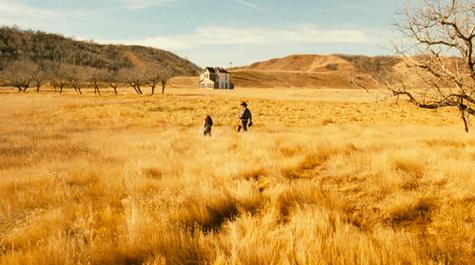Tideland (Terry Gilliam, 2005)
When I saw Terry Gilliam’s Tideland at the Melbourne Film Festival last year, my immediate reaction was that the film was unreleasable. Its appearance in Australian cinemas has obviously proven me wrong. Yet its exposure to a wider population allows the opportunity to see how many, like me, find the film virtually unwatchable. Gilliam is an enormously talented filmmaker, and Tideland isn’t bad in any of the usual ways. It’s not reprehensible, or stupid, or poorly made. But it’s a deeply unpleasant experience that just doesn’t work at all.
Scripted by Gilliam and Tony Grissoni from Mitch Cullin’s novel, the film tells the story of a Jeliza-Rose (Jodelle Ferland), a young girl brought up by junkie parents (Jeff Bridges and Jennifer Tilly). She’s an intelligent girl, and at film’s start seems to be coping remarkably well with the unhealthy environment in which she is being brought up. However, after both parents die she is left alone in an empty farmhouse, accompanied only by her dolls and the slowly rotting corpse of her father. Even when she makes contact with the neighbours, she is no closer to achieving responsible care: they, too, are deeply disturbed.
Gilliam has the start of a really good idea here, in the way he depicts Jeliza-Rose’s deteriorating mental health by showing her play becoming increasingly warped and unhealthy. Yet despite spending a long, long, long time establishing Jeliza-Rose’s fantasy world, Gilliam can’t really bring that inner life into clear enough focus. He tries to convey the wonder of the child’s perspective with a sweeping camera and lush, golden cinematography, but he can never get us inside Jeliza-Rose’s head, and the longer he keeps at it the more distant from her we become. Worse, his attempts sour into a kind of syrupy whimsy that recalls Spielberg at his worst.
The film starts with an undercurrent of grotesque humour, and the gothic tone becomes more overt as the film progresses. As we learn more about Jeliza-Rose’s new neighbours (and as her father’s decomposition steadily progresses) the film becomes livelier, but it also becomes increasingly disturbing. The humour becomes more morbid, and the film itself increasingly hard to watch as it touches on issues of inappropriate sexual relationships involving both children and the mentally disabled.
Obviously there is a place for films to tackle such challenging themes, and it can also be expected that when films do so the result may be discomforting. But there is a corresponding responsibility that such material brings with it. I’m not suggesting there is anything inappropriate in Gilliam’s message, but rather that his intent is muddled, and that with such sensitive topics there is a heightened obligation to have control over your material. Unfortunately, Gilliam raises these issues but doesn’t seem to know how to resolve them. The end result alternates stretches of boredom with moments of skin-crawling queasiness. Gilliam has reportedly had to reassure audiences at festivals that it’s okay to laugh, but I suspect more will be wondering if it’s okay to leave.
It’s a real shame that Tideland is such a miserable experience, because Gilliam, for all his faults, is one of the most talented filmmakers around, and he already struggles to find financing for his projects. The film Lost in La Mancha famously chronicled his aborted version of Don Quixote, which started production but was scuttled without being finished. Yet I have the feeling that the abandonment of Don Quixote won’t prove as damaging for his career as the completion of Tideland.
